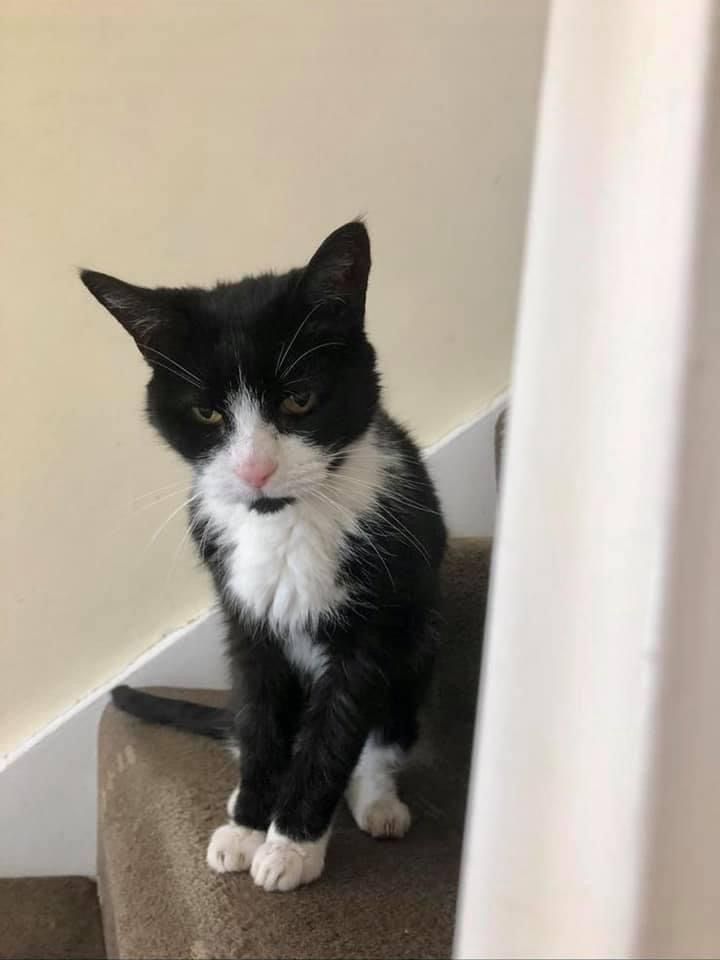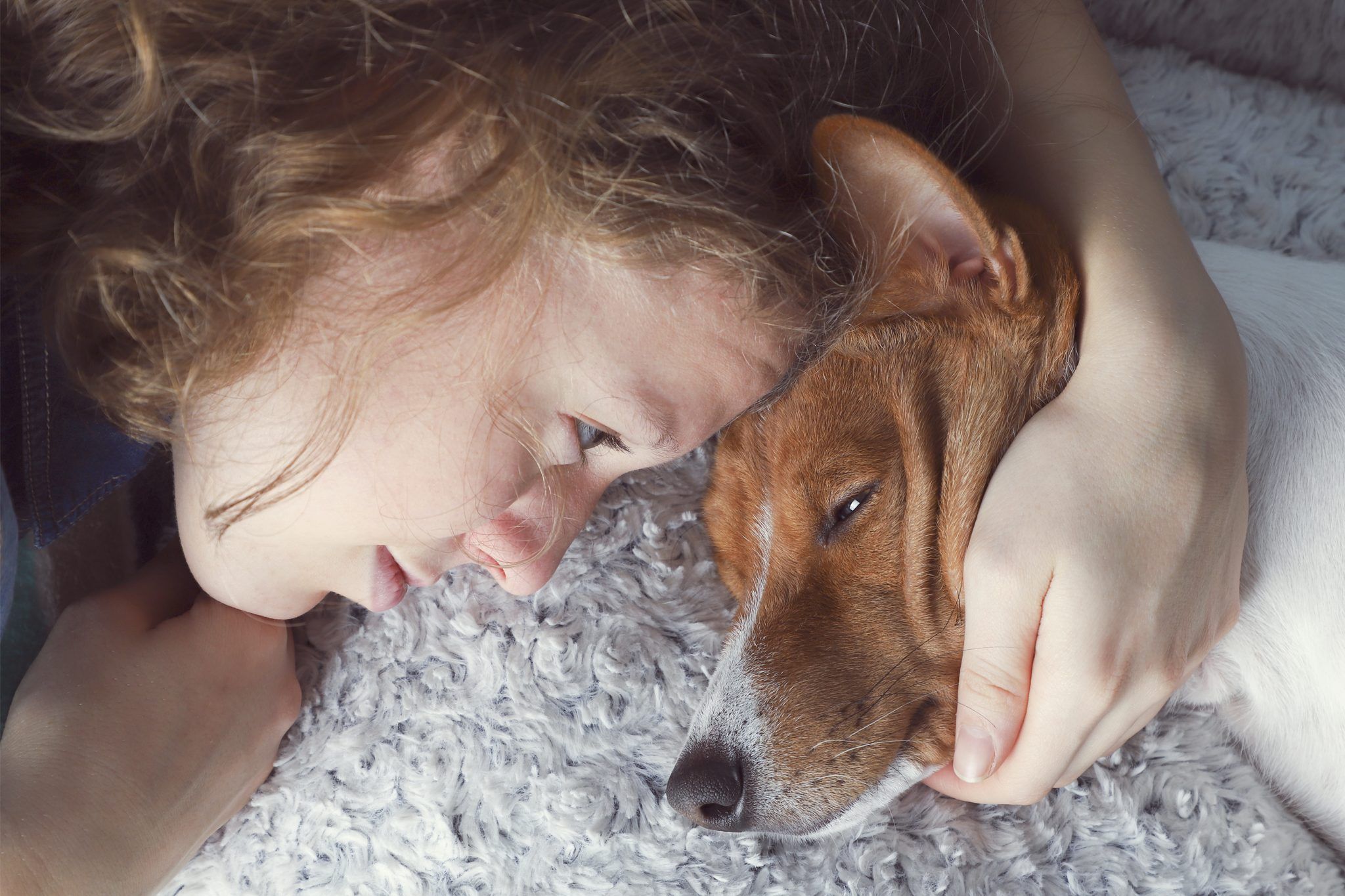

Share
17th August 2021
08:04am BST

 Wendy with Zac[/caption]
A new survey shared exclusively with JOE and conducted by pet wellness brand Itch has revealed that nearly three-in-five (58 per cent) of Brits equate losing a pet to the trauma of losing a family member. 74 per cent believe employers should have a pet bereavement policy, and almost half (45 per cent) of employees say they have hidden a pet's death from their employer.
Despite these shocking findings from the 2,026 Brits surveyed, as it stands there is no policy in place from the government when it comes to acknowledging bereavement.(Brits aren't given legal bereavement leave when humans pass away either, although the Employment Rights Act 1996 allows for time off for the death of a dependent, which could be a close relative or friend.)
Helen Roberts, who lost her 20-year-old cat Sweep during the pandemic, tells JOE she was "deeply upset" after the passing. However, she was thankful her employer allowed her to claim one day of unpaid leave to grieve in private, without onlookers noticing. "I was glad of being able to work from home as I could be alone in my office and if I got upset no one would see my tears and I would have felt embarrassed," she says.
[caption id="attachment_284655" align="alignnone" width="720"]
Wendy with Zac[/caption]
A new survey shared exclusively with JOE and conducted by pet wellness brand Itch has revealed that nearly three-in-five (58 per cent) of Brits equate losing a pet to the trauma of losing a family member. 74 per cent believe employers should have a pet bereavement policy, and almost half (45 per cent) of employees say they have hidden a pet's death from their employer.
Despite these shocking findings from the 2,026 Brits surveyed, as it stands there is no policy in place from the government when it comes to acknowledging bereavement.(Brits aren't given legal bereavement leave when humans pass away either, although the Employment Rights Act 1996 allows for time off for the death of a dependent, which could be a close relative or friend.)
Helen Roberts, who lost her 20-year-old cat Sweep during the pandemic, tells JOE she was "deeply upset" after the passing. However, she was thankful her employer allowed her to claim one day of unpaid leave to grieve in private, without onlookers noticing. "I was glad of being able to work from home as I could be alone in my office and if I got upset no one would see my tears and I would have felt embarrassed," she says.
[caption id="attachment_284655" align="alignnone" width="720"] Helen's cat, Sweep[/caption]
Despite the experiences of people like Wendy and Helen, Diane James from the Blue Cross Pet Bereavement Support Service says she only knows of about 10 companies in the UK with pet bereavement support available for their staff, pointing to a severe lack of structural support across UK workplaces.
"Blue Cross has contacted the Chartered Institute of Personnel and Development (CIPD) about this but to no avail," Diane explains to JOE. "We asked to have our details in the handbooks of all companies, so that we can offer them support and to advise having a policy in place."
Echoing Wendy's sentiment, Diane continues: "The effect of pet loss is for many like losing an important part of the family unit... Having a clear and definitive pet bereavement policy would ensure people's welfare is paramount at this sad time."
In 2019 the issue briefly gained wider attention after Emma McNulty, who was 18 at the time, set up a petition to campaign for pet bereavement leave after she was fired from a fast food chain for not showing up for work after losing her 14-year-old Yorkshire Terrier, Mily.
[caption id="attachment_284663" align="alignnone" width="1230"]
Helen's cat, Sweep[/caption]
Despite the experiences of people like Wendy and Helen, Diane James from the Blue Cross Pet Bereavement Support Service says she only knows of about 10 companies in the UK with pet bereavement support available for their staff, pointing to a severe lack of structural support across UK workplaces.
"Blue Cross has contacted the Chartered Institute of Personnel and Development (CIPD) about this but to no avail," Diane explains to JOE. "We asked to have our details in the handbooks of all companies, so that we can offer them support and to advise having a policy in place."
Echoing Wendy's sentiment, Diane continues: "The effect of pet loss is for many like losing an important part of the family unit... Having a clear and definitive pet bereavement policy would ensure people's welfare is paramount at this sad time."
In 2019 the issue briefly gained wider attention after Emma McNulty, who was 18 at the time, set up a petition to campaign for pet bereavement leave after she was fired from a fast food chain for not showing up for work after losing her 14-year-old Yorkshire Terrier, Mily.
[caption id="attachment_284663" align="alignnone" width="1230"] Emma and her dog, Milly[/caption]
"I informed my manager I could not come into work as I was too devastated and physically sick to do so," Emma writes in the description of her Change.org petition, which has over 28,000 signatures.
Her description continues: "Instead of being shown the compassion and sympathy stated in the contract I was sent a number of nasty messages and told I had to cover my shift as no bereavement time was allowed for pets. I did not go to work that day and I was recently fired and left unemployed the same day as losing my best friend, this caused me extreme distress and sickness."
Now at university, Emma told JOE that her Change.org petition is still gaining daily signatures and she has had counsellors who specialise in bereavement reaching out.
George Cooper, 35, a sports journalist based in London, also found his workplace wasn't a safe space when it came to sharing his feelings over grieving for his cast Milo.
A "huge, lumbering ginger tom cat," Milo was tragically run over and killed in 2013. Like Helen, George felt he needed to hide being visibly upset from his employer. "I worked in a busy office where conversation revolved largely around the job," he says. "I told a few colleagues but after some sympathetic words, it was old news. I did my crying in the kitchen."
[caption id="attachment_284654" align="alignnone" width="2048"]
Emma and her dog, Milly[/caption]
"I informed my manager I could not come into work as I was too devastated and physically sick to do so," Emma writes in the description of her Change.org petition, which has over 28,000 signatures.
Her description continues: "Instead of being shown the compassion and sympathy stated in the contract I was sent a number of nasty messages and told I had to cover my shift as no bereavement time was allowed for pets. I did not go to work that day and I was recently fired and left unemployed the same day as losing my best friend, this caused me extreme distress and sickness."
Now at university, Emma told JOE that her Change.org petition is still gaining daily signatures and she has had counsellors who specialise in bereavement reaching out.
George Cooper, 35, a sports journalist based in London, also found his workplace wasn't a safe space when it came to sharing his feelings over grieving for his cast Milo.
A "huge, lumbering ginger tom cat," Milo was tragically run over and killed in 2013. Like Helen, George felt he needed to hide being visibly upset from his employer. "I worked in a busy office where conversation revolved largely around the job," he says. "I told a few colleagues but after some sympathetic words, it was old news. I did my crying in the kitchen."
[caption id="attachment_284654" align="alignnone" width="2048"] George's cat, Milo[/caption]
George agrees that pet bereavement leave should be more widely available. "What I needed was a working environment that recognised losing a pet – particularly so tragically - is like losing a family member," he says.
He would also like Brits to shake off the stigma around pet bereavement. "Some time off would have helped, but even talking about it without being made to feel silly would have been better than nothing."
One of the Brits helping remove the stigma about pet bereavement is Lisa Howe, founder of Pet Bereavement Services, who told JOE she is contacted by around 50 people per month, with many of those seeking counselling to help them move past their lost pets.
"I am certainly seeing this figure rising consistently, due to the Covid 19 pandemic," she says. "This is due to the fact that people have not been able to say goodbye to their pets, in the way they had wished, due to restrictions."
Lisa, who is an RCVS qualified veterinary nurse with 15 years' experience, says she's looking to take on more counsellors to cope with demand. "I am definitely struggling to meet demand currently," she says. "I often hear that the Blue Cross are great for initial advise, but people want to undertake counselling to help them move forward."
[caption id="attachment_285040" align="alignnone" width="2048"]
George's cat, Milo[/caption]
George agrees that pet bereavement leave should be more widely available. "What I needed was a working environment that recognised losing a pet – particularly so tragically - is like losing a family member," he says.
He would also like Brits to shake off the stigma around pet bereavement. "Some time off would have helped, but even talking about it without being made to feel silly would have been better than nothing."
One of the Brits helping remove the stigma about pet bereavement is Lisa Howe, founder of Pet Bereavement Services, who told JOE she is contacted by around 50 people per month, with many of those seeking counselling to help them move past their lost pets.
"I am certainly seeing this figure rising consistently, due to the Covid 19 pandemic," she says. "This is due to the fact that people have not been able to say goodbye to their pets, in the way they had wished, due to restrictions."
Lisa, who is an RCVS qualified veterinary nurse with 15 years' experience, says she's looking to take on more counsellors to cope with demand. "I am definitely struggling to meet demand currently," she says. "I often hear that the Blue Cross are great for initial advise, but people want to undertake counselling to help them move forward."
[caption id="attachment_285040" align="alignnone" width="2048"] Almost three quarters of Brits believe employers should offer bereavement support[/caption]
While Wendy, Emma, Helen, George and Lisa are waiting for movement from the Government on the right to bereavement leave, others believe waiting for a legal intervention shouldn't be necessary.
They include Robin Grey, bereavement counsellor, psychotherapist and author of Coping with Pet Loss, who thinks HR managers needn't wait for the legal enforcers in order to help make nationwide change.
"Businesses should be able to show compassion for either pet or human loss without the law telling them to do so," he says. "It's as simple as adding a few lines into already existing staff handbooks or guidelines to make staff feel listened to and supported."
Itch is hoping the bereavement policy they have in place, which allows every employer one day of paid leave if they lose a pet, will be mirrored elsewhere. Andrew Pinnington, CEO at Itch, said: "The death of a pet can feel like one of the hardest losses and for many is on a par with losing a family member.
"With this in mind, we would like to see employers across the UK recognise the impact of pet bereavement on the health and well-being of their staff, and to be receptive to the idea of developing policies and guidelines."
In a statement to JOE, Rachel Suff, senior employment relations adviser at the CIPD, the professional body for HR and people development, said there has not been any research conducted yet in the field of pet bereavement policy.
She said: "Losing a loved family pet can be very upsetting and organisations should show empathy and understanding whatever the cause of an employee’s distress. The specific support and leave they offer is a decision for each organisation but providing some kind of flexibility could be very helpful.
"Where organisations do show kindness and compassion towards people experiencing challenging events, they will be rewarded with higher levels of commitment and loyalty in return."
Almost three quarters of Brits believe employers should offer bereavement support[/caption]
While Wendy, Emma, Helen, George and Lisa are waiting for movement from the Government on the right to bereavement leave, others believe waiting for a legal intervention shouldn't be necessary.
They include Robin Grey, bereavement counsellor, psychotherapist and author of Coping with Pet Loss, who thinks HR managers needn't wait for the legal enforcers in order to help make nationwide change.
"Businesses should be able to show compassion for either pet or human loss without the law telling them to do so," he says. "It's as simple as adding a few lines into already existing staff handbooks or guidelines to make staff feel listened to and supported."
Itch is hoping the bereavement policy they have in place, which allows every employer one day of paid leave if they lose a pet, will be mirrored elsewhere. Andrew Pinnington, CEO at Itch, said: "The death of a pet can feel like one of the hardest losses and for many is on a par with losing a family member.
"With this in mind, we would like to see employers across the UK recognise the impact of pet bereavement on the health and well-being of their staff, and to be receptive to the idea of developing policies and guidelines."
In a statement to JOE, Rachel Suff, senior employment relations adviser at the CIPD, the professional body for HR and people development, said there has not been any research conducted yet in the field of pet bereavement policy.
She said: "Losing a loved family pet can be very upsetting and organisations should show empathy and understanding whatever the cause of an employee’s distress. The specific support and leave they offer is a decision for each organisation but providing some kind of flexibility could be very helpful.
"Where organisations do show kindness and compassion towards people experiencing challenging events, they will be rewarded with higher levels of commitment and loyalty in return."Explore more on these topics: